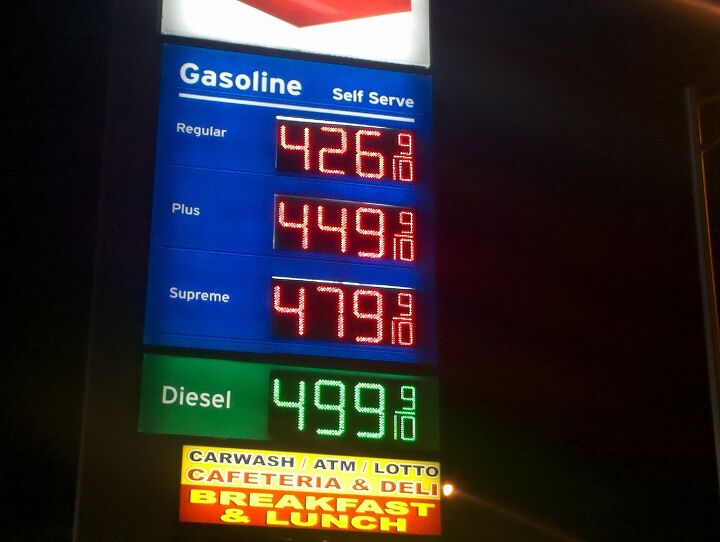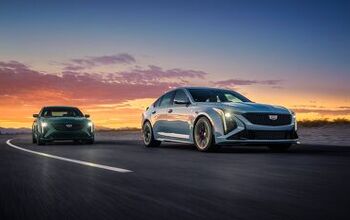Study Claims Car Shoppers Don't Care About Swelling Fuel Prices

Average fuel prices in the United States managed to triple between the years of 1999 and and 2012. While we’ve been fortunate enough to enjoy relatively low prices at the pump over the last few years, analysts predict the current spike will continue through the summer.
However, a recent study from Kelley Blue Book suggests most new-vehicle buyers don’t give a flip about it, with consumers claiming the price surge won’t influence their vehicle purchasing decisions in the slightest.
The assumption that the cost of gas will stabilize in the fall could play a factor for some, but many respondents say the price per gallon would have to reach $4 before they became rattled enough to consider swapping to a more economical vehicle.
Kelley Blue Book’s Current Events Panel, which conducted the survey, found that more than 20 percent of respondents expect fuel to “move up significantly in the coming year.” But roughly 60 percent of respondents say it’s unlikely that the recent surges will affect the next vehicle they decide to buy. While that bodes well for automakers that are hurriedly pumping more crossovers into their lineups, it doesn’t give them much incentive to improve fuel economy.
“What we see now is more of the sport utility vehicle [and] crossover vehicles are built on car platforms, and they get much better vehicle economy, in fact there isn’t much penalty between a midsize sedan and a compact sport utility,” Michelle Krebs, senior analyst with Autotrader, told Automotive News. “Despite the rise in gas prices, people still want the versatility and practicality of those utility vehicles.”
Let’s use Honda’s Accord and CR-V as an example. In its most efficient form, the crossover manages to average 28 city and 34 highway mpg, while the base sedan manages 30 city and 38 on the highway. While that’s not insignificant, you probably won’t notice huge savings at the pump on a day-to-day basis. While the Accord is more powerful, lighter, and costs a bit less, the crossover recipe has proven it to be the clear winner with consumers. Last month, Honda moved 28,323 CR-Vs and 21,751 Accords in the United States.
However, gas prices have only been increasing by a noticeable margin for a few months. The market could shift if shoppers find themselves saddled with a full year of expensive fuel. Even then, most experts believe it would be difficult to pry most consumers away from CUVs. Analysts from Kelley Blue Book suggest that fuel prices would need to climb more than 35 percent from current levels to affect the industry in a meaningful way. But that could just cause people to buy more economical crossovers, rather than re-adopt cars.
“They haven’t been high for long enough that we would see any change and I think the desirability of crossover vehicles and various utility vehicles outweighs concerns about higher gas costs,” Krebs said.
[Image: Daniel Christensen/ Wikimedia Commons ( CC BY-SA 3.0)]

A staunch consumer advocate tracking industry trends and regulation. Before joining TTAC, Matt spent a decade working for marketing and research firms based in NYC. Clients included several of the world’s largest automakers, global tire brands, and aftermarket part suppliers. Dissatisfied with the corporate world and resentful of having to wear suits everyday, he pivoted to writing about cars. Since then, that man has become an ardent supporter of the right-to-repair movement, been interviewed on the auto industry by national radio broadcasts, driven more rental cars than anyone ever should, participated in amateur rallying events, and received the requisite minimum training as sanctioned by the SCCA. Handy with a wrench, Matt grew up surrounded by Detroit auto workers and managed to get a pizza delivery job before he was legally eligible. He later found himself driving box trucks through Manhattan, guaranteeing future sympathy for actual truckers. He continues to conduct research pertaining to the automotive sector as an independent contractor and has since moved back to his native Michigan, closer to where the cars are born. A contrarian, Matt claims to prefer understeer — stating that front and all-wheel drive vehicles cater best to his driving style.
More by Matt Posky
Latest Car Reviews
Read moreLatest Product Reviews
Read moreRecent Comments
- ToolGuy If these guys opened a hotel outside Cincinnati I would go there to sleep, and to dream.
- ToolGuy Michelin's price increases mean that my relationship with them as a customer is not sustainable. 🙁
- Kwik_Shift_Pro4X I wonder if Fiat would pull off old world Italian charm full of well intentioned stereotypes.
- Chelsea I actually used to work for this guy
- SaulTigh Saw my first Cybertruck last weekend. Looked like a kit car...not an even panel to be seen.


































Comments
Join the conversation
It affected my latest car purchase. Instead of buying A V6 engine in my 2017 Impala I went straight for the 2.5 model which was far more plentiful, optioned the way I liked and had the exterior color I wanted. While real world MPG isn't drastically better it does get 3-4 better in everyday driving than my V6 W-body Impala, is very refined and offers plenty of power for the type of driving I do. Also of note, the EPA highway rating of 30 is 100% bogus for this car. With 3 people in the car going 75 MPH and the A/C blasting I easily exceeded that rating by 3-4 MPG on average and have seen upwards of 38 MPG at lower speeds. So far I am very happy with this decision.
Not trying to throw political crap but I still get flashbacks from the last time a Republican was president and $5 regular was a thing. This is why I'm preemptively getting rid of my Sierra relatively soon with a sort of "better be safe than sorry" kind of attitude. If gas stays low, fantastic. It's over 10 years old now and it's time to finally get into something more practical anyway since I'm no longer in construction. I actually like sedans and not too fond of crossovers so I hope to gain a minor advantage buying/selling because pickups are hot right now and sedans are so-called lot poison.